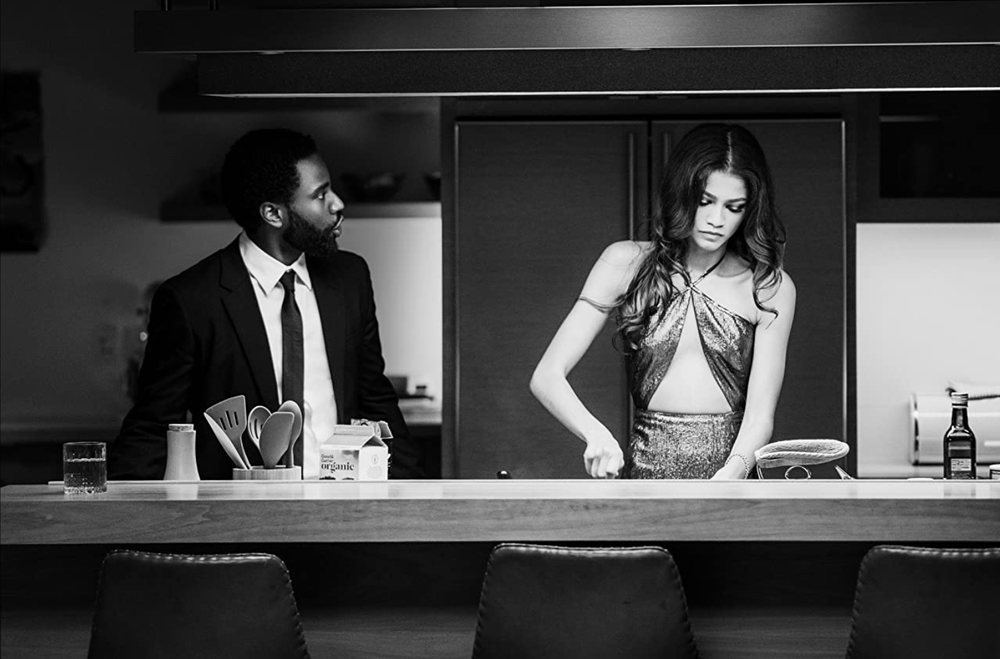I thought I knew about Malcolm & Marie when I sat down to watch it. I knew it was a black and white movie, was filmed during a pandemic, starred John David Washington and Zendaya, and was written and directed by her Euphoria collaborator Sam Levinson. I also knew — or thought I knew — that it was about relationship fights, the kind of squabbles and bickering that we all experience. I expected a movie about marriage and partnership that I could identify with.
You may be going into the movie expecting the same. But you should also go in prepared for what actually transpires in Malcolm and Marie’s home and how we define it.
The movie opens with Malcolm pacing around the house, his adrenaline still coursing after being in a room full of critics and peers raving about his movie premiere. He’s so consumed by his excitement that he doesn’t notice Zendaya stewing as she lights a cigarette. It seems like a night we’ve all had before: one person so hype that they don’t register how their partner is feeling about a missed hug, an unfeeling comment, or someone being too flirty. The static is light, but the unsaid feelings are bubbling just below the surface. Relatable.
Then things fall apart.
There were two sides to Malcolm and Marie’s fight like there were two sides to who won the presidential election.
The night deteriorates into something far more chaotic, volatile, and destructive. We’ve all been in arguments that led to raised voices, hurt feelings, things we wish we’d never said. But this? This fight between Malcolm and Marie was brutal. It was abusive. And it ventured far outside the realm of what we should consider the argument of a healthy relationship.
While Levinson’s script was sharp, if a bit uneven at times, it failed to produce two compelling sides, two equally justifiable perspectives. The movie instead veered into a seemingly endless reel of a man terrorizing a woman who was emotionally trapped in a house, unable to escape. There were two sides to Malcolm and Marie’s fight like there were two sides to who won the presidential election.
Maybe this was intentional. Whatever the case, I don’t want anyone going in or walking out of the movie thinking Malcolm’s treatment of Marie was anything remotely close to acceptable or that it’s something we should endure to make a relationship work.
Malcolm doesn’t really ever have a valid argument beyond his own egomania and resentment for something Marie had no control over. I went into the movie wanting to be challenged about whose side I would take or that I’d leave the movie debating over who was actually in the wrong, but I couldn’t bend my brain to find any sympathy for the man hurling devastating insults at his partner while she cowers in a bathtub. I don’t want them to find a resolution. I want her to find an escape.
The movie’s abrupt turn starts when Malcolm, after having been bested by Marie early in the argument, brings up her struggles with addiction, essentially holding over her head the fact that he stayed with her through rehab. He cites her suicide attempt to demonstrate how she should be thankful he’d stuck around. This is textbook abuse — and, sadly, it answers the question of why she doesn’t leave.
After that moment, Malcolm & Marie never returns to a safe space. Even as the night ebbs and flows between fury and loving banter, the echo of Malcolm’s abuse reverberates off of every wall of the house. The undercurrent of instability lends the air of a horror movie; you stay on edge, expecting but never knowing when the monster will creep out of the shadows.
That feeling of despair permeates every night of intense arguing in a relationship—that period of fear when you step lightly, careful not to rekindle a fire that has just been tamped down. That’s the feeling and tension I think I’m supposed to relate to, and I do, but I’m not sure it’s in the way the movie intended. I don’t relate to the uneasiness as a married person trying to avoid standard marriage fights. Instead, I relate as someone who has endured traumatic, emotionally abusive relationships that were toxic to my well-being and mental health. Malcolm & Marie is reminiscent of that trauma, and I’m sure it’s triggering for people who have survived abuse, manipulation, and gaslighting in relationships.
These aren’t two people in a relationship trying to make it work out. It’s a villain and a woman trying to survive. So much of the tension lies in the worry about whether or not Malcolm is going to drive Marie back to addiction or self-harm. We wonder if she’s going to even survive the night. If Malcolm is trying to rid himself of his wife for good or if he’ll even cry if she does drown in their bathtub.
Malcolm & Marie is a good movie in the way that movies can be objectively good. The dialogue is snappy. The acting, especially from Zendaya, is a sign of two powerhouses who are destined to impress (and ultimately be snubbed by) award judges. It’s worth a watch for sure. But it’s also far darker than the marketing materials have presented it.
This isn’t a movie about relationship trials and tribulations or a lens into the pitfalls that we all struggle to overcome. It’s not “$200 dates” in movie form. Instead, Malcolm & Marie is about devastation. Abuse. Pain. Watching one person you desperately wish you could free from a painful relationship with a monster. My hope is that if you do watch the movie and see yourself, then you can use it as a path to something better. Something that doesn’t include the person who reminds you of Malcolm.
